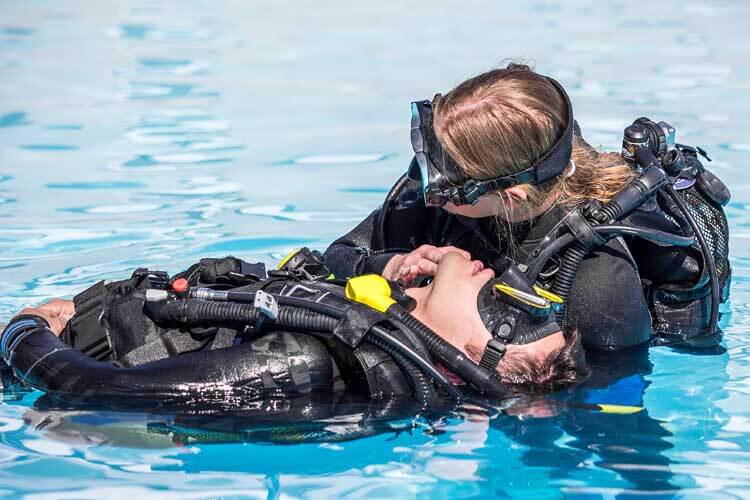
The typical ‘Advanced Open Water’ type scuba course is not meant to be ‘advanced’, but, rather, an important advancement of our entry-level skills – skills that, as divers, we should always seek to advance through continual education
‘I recommend waiting until you have some experience before you do your Advanced Open Water Course,’ I overheard a fellow diver say to his less experienced listeners, and my ears pricked up before replying – in a rather more imposing timbre than my voice normally carries – ‘No! Do it as soon as possible after your Open Water Course!’
The (polite) rant I subsequently embarked upon is based on decades of misinterpretation of what is actually meant by ‘Advanced Open Water’ training, and, in fact, what ‘learning to dive’ actually entails.
As we are talking recreational diving, Advanced Open Water for PADI is the next major certification following the entry-level Open Water Diver course. SSI has an identically titled certification; NAUI has ‘Advanced Scuba Diver’, even BSAC recently introduced an ‘Advanced Ocean Diver’ as its entry-level successor.
In fact, according to an agency crossover spreadsheet knocking about on the Internet, there are at least 16 different ‘Advanced’ agency certifications which directly follow entry-level training. Of all the big-name agencies, only BSAC has an actual certification called ‘Advanced Diver’, which is just one step below its top-tier ‘First Class Diver’.
More from DIVE’s learning to dive series
- 15 things you need to know about learning to dive
- Is scuba diving safe?
- Is scuba diving right for me?
- What to expect from a scuba diving course
- Which training agency is best for entry level diving?
The key takeaway from this is that there are exactly no ‘Advanced Open Water’ or equivalent certifications that turn you into an ‘advanced’ diver. They are not advanced courses, they are adjuncts to the entry-level course – they are ‘Entry-Level- Plus’.
They are the bits that are not, strictly-speaking, necessary to allow people to dive in the environment in which they have been trained – and where they will almost certainly be supervised while doing so – but are part of the pathway that all divers must follow before considering diving independently.
The modular nature of dive courses is primarily to allow people to begin dive training without having to commit to a vast amount of time and expenditure in advance, and instead continue their education at a price and pace that suits their personal circumstances. Most entry-level courses are 3-5 days long and cost an average of around £400 in your typical holiday resort environment – a timescale and budget quite reasonable for the average week-long family holiday or typical gap-year traveller.
Mandating the extra 2-3 days and £350 of the typical ‘Advanced’ training sessions as requirements for entry-level certification would make the programme too expensive and too time consuming, and, therefore, unappealing to the interested, but uncertain novice. Unscrupulous operators would undoubtedly cut corners across both training and safety standards to make their programmes more appealing to customers’ budgets, already an industry-wide – albeit diminishing – problem.
Encouraging divers to continue their education as soon as possible – even if that is a year or more later – means that novice divers gain immediate experience of deeper diving and the fundamentals of underwater navigation that are mandatory aspects of most advanced programmes, under the guidance of a professionally trained instructor.
While this makes them experts in neither, 30m is a long way from the surface, and it is better that divers can are informed of the potential pitfalls of deep diving (increased risk of DCS/DCI; nitrogen narcosis), and experience it first-hand with an instructor, rather than accidentally venturing into deep water and be unprepared to deal with brain fog and the potential for unplanned decompression stops.
Adding in some early training in drift diving, the underwater ecosystem, underwater photography and better buoyancy control would also be substantially better than watching a diver clinging on to fire coral in a strong current, trying to take a close-up photo of a bullet-fisted harlequin shrimp with their fins shredding the gorgonian forest below (all true – if artistically amalgamated – stories!)
Training does not stop at Advanced Open Water – in fact – I consider that a diver has not even truly completed their beginner-level training until they have earned the equivalent of their Open Water, Advanced Open Water and Rescue Diver certifications – another course title that is consistently misinterpreted.
Like advanced entry-level courses are not designed to turn people into advanced divers, stress and rescue courses are not designed to turn divers into Search and Rescue paramedics. They provide essential lay person training to help divers in distress or with medical emergencies while professional services are called to the scene. Stress and rescue courses are valuable tools in recreational diver safety – I know from direct, personal experience, that the training works.
As divers, we should always seek to learn more. I think that is true for all aspects of life, but especially so for something about which we become so passionate, and which can be fraught with dangers for the unwary.
Learning to dive doesn’t end when we earn our first certification. As divers, we should never stop learning.
- Search for missing divers after boat capsizes off Davao Oriental, Philippines - 19 January 2026
- Review – Garmin Descent Mk3i smartwatch-style dive computer - 16 January 2026
- Pioneering maritime archaeologist Robert Grenier dies at 88 - 12 January 2026




